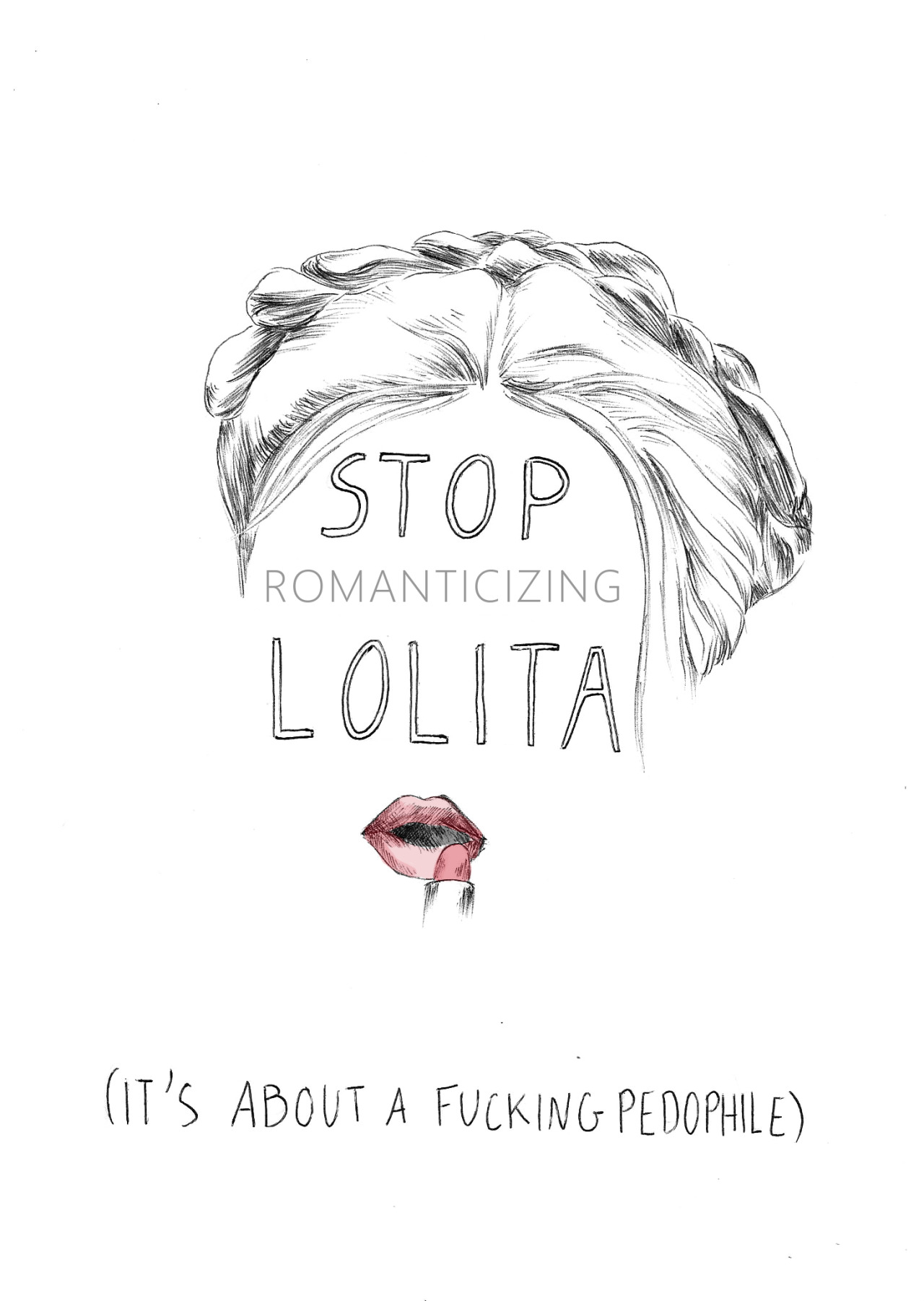traitspourtraits:therandommeerkat:e-crimes:ecelebreviews:are-soul:~And murderer…And a rapist. And he
traitspourtraits:therandommeerkat:e-crimes:ecelebreviews:are-soul:~And murderer…And a rapist. And he kidnapped his victim and held her against her will. Like seriously, I fully understand that this is (generally speaking) mostly the fault of the screen adaptations of the novel, which tend to paint it as a love story, and you have to remember that all the actresses who have played Lolita have been older than she was. Even the above image uses a film representation of Lolita which is inaccurate, but it is iconic and probably purposeful so w/e.If you think Lolita is romantic, you should read the book while consistently and purposely reminding yourself H.H. is a pedophile, and he’s manipulating you. Seriously, the whole thing with Lolita as a text is that the narrator is unreliable. Please also try to keep in mind that Lolita is 12 - 15 in the book, and that H.H. deliberately conceals his age from the reader by being vague and cryptic, but he’s roughly around 37 - 42 across the whole timeline of the story, if you do the maths he gives you. H.H. literally rapes Lolita every single fucking day for over two years. It isn’t romantic, that was never the point. H.H. is fully aware he’s a rapist, too, he describes it as rape offhandedly, but still as rape. What you should be doing when you read Lolita is looking at all the ways pedophilia, date rape, statutory rape, forcible rape, kidnapping, murder, assault, molestation, etc are played down and normalised through beautiful prose and slight of narrative hand. That’s why Lolita is a classic novel. Because it’s terrifying that we can so easily be made to side with a monster and blame the victim based on the lies the monster tells us, so long as he makes it sound pleasant. Lolita was never controversial or banned because it’s a story about a rapist and his victim, it was controversial because it forced the reader to sympathize with a child rapist.It’s about manipulation and language and victim blaming even when the crime is completely black and white. That’s what Lolita is about. Lolita is not a love story, it is not romantic, and if you think it is then the book has defeated you. Lolita is not about a “young girl who seduces an older man,” nor is it a fashion statement, nor does it have anything to do with DD/lg or sexual kinks/fetishes, or love, or star-crossed lovers, or pastel coloured frocks, or suspenders, or choker necklaces and collars and pet tags, or consensual relationships between two heterosexual adults who happen to have a large age gap between them. It’s about a pedophile who falls in love with his landlady’s 12 year old daughter, marries said landlady so he can have full access to her daughter, kidnaps her daughter after she is hit by a car and killed, then travels across America for a year with the daughter while raping her everyday, gets a house far away from the girl’s only friends and family, continues to rape her everyday, takes to the road again still raping her everyday, until she runs away with another rapist because she’s so desperate to get away from him. That’s the bare bones of it. It’s not about sex or romance, there is never any kind of consensual sex between them, or arguably at all in the novel as a whole.Go read the academic essays that take H.H.’s side when you’re done. There’s plenty of them, they aren’t hard to find. Look at what they call Dolores Haze. Read the abomination that is Lo’s Diary. Look at how they treat her, look at how they talk about how she’s the monster, the perpetrator, the devil child, the whore, the temptress, evil, plotting, violent, harpy, shrew. Even though she was 12. Then you’ll understand what Lolita’s about. Can I also just say while I’m here, that Lolita was an extremely important novel when it was published because very little had been done in the way of looking at how child sexual abuse affects children as they move toward and into adulthood, nor were there any hard statistics on child sexual abuse, and Lolita brought the subject into the public eye and caused actual interest in the subject that there hadn’t been before, inspiring research on the subject that was the foundation for what we know today. That wouldn’t have happened when it did if not for Lolita, and we may not be where we are today in terms of knowledge, awareness and resources. By no means the only thing, but it was really important toward it. A lot of people who read the book and see H.H. for what he is think the book is pointless and smut, but the book is so important in it’s historical context, just like any other banned and/or censored piece of fiction (see Ulysses for a start). And finally, here’s a quote from the novel quote that I feel like sums everything up:“We had been everywhere. We had really seen nothing. And I catch myself thinking today that our long journey had only defiled with a sinuous trail of slime the lovely, trustful, dreamy, enormous country that by then, in retrospect, was no more to us than a collection of dog-eared maps, ruined tour books, old tires, and her sobs in the night - every night, every night - the moment I feigned sleep.”The most horrifying thing is that people actually treat real CSA victims and abusers in the same way. Think of Woody Allen, for instance. If H.H. was brought to court he would win with flying colours. People actually paint actual rape victims as teenage seductresses. Lolita is real.Reblogging my own post for the brilliant text, and the last example. Thank you -- source link
#tw: csa#csa#lolita#dolores haze#nabokov#child abuse#literature history#historical context#rape culture#victim blaming#queue
